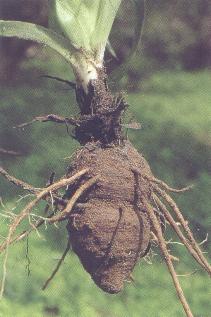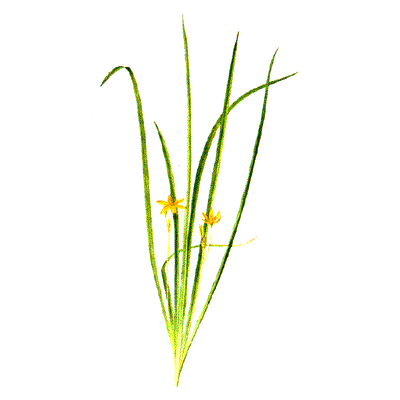Reprinted from The SA
Retail Chemist 01/08/1997
Professor Piet van Jaarsveld, head of Pharmacology at the University of Stellenbosch's
Medical School, and a member of the research team, is quoted in an article in the popular
magazine You (July 10, 1997), saying: 'It's the remedy of the future. People will
take it to prevent colds and infections, the way they now take vitamins.' The headline on
the front page of You reads SA's Miracle Muti for Deadly Diseases.
We have already featured a news report on research on Hypoxis rooperi - common European
names, the African potato or sterretjie. That entry drew e-mail queries from as far away
as Gabon. The article deals with an unnamed preparation made from the plant, hailed as an
important breakthrough in the fight against AIDS. Sterols and sterolins isolated from the
plant are credited with efficacy in treating AIDS, cancer, TB, yuppie flu, arthritis and
psoriasis.
You mentions Professor Patrick Bouic of the University of Stellenbosch's
Medical School, who is conducting trials on Hypoxis but, significantly perhaps, the
article does not quote him. It states that the preparation 'increases the body's natural
resistance to disease'.
The plant was discovered by 78- year-old Randburg businessman R. W. Liebenberg, 40
years ago, when a relative made a miraculous recovery from prostate cancer after drinking
a brew made from the sterretjie. In 1967, R.W. says, the plant was analysed at the
University of Natal. In the 1980s research started, and in 1992 a trial on 200 HIV
positive patients began. The article claims that the preparation was successful in
'stabilising the CD4-T cell count in both HIV+ and full-blown AIDS subjects.'
Another study, using cats with feline immune deficiency virus, points to the
possibility that it could help prevent in utero transmission of the HIV virus. Professor
Ben Smit, head of the Department of Oncology at Tygerberg, comes across as less
enthusiastic saying only that the supplement does seem to slow down the growth of certain
types of cancer.
The article is spiked with a series of anecdotal accounts: of an (unnamed) HlV-positive
woman who feels she has benefited from treatment; a 72-year-old sufferer from cancer of
the gall bladder who says he owes his life to Hypoxis; a woman with motor neuron disease,
an arthritis sufferer, and others.
Perhaps to protect themselves from a flood of enquiries, You states that
supplements containing sterols and sterolins are available over the counter. Pharmacists
and possibly doctors might field increased requests for it.
Tell Me More
When Penelope (not her real name) was diagnosed HIV positive she thought her life was
over. She immediately wrote a will, invested money for her baby daughter and decided who
she'd ask to raise the child when she was no longer around.
That was two years ago. Today the 28-year-old Cape Town single mother is the picture of
health and looks forward with confidence to some day becoming a grandmother. She has
renewed energy and new hope - thanks to a medicine which encourages the body's immune
system to fight the infections which can ravage HIV-positive patients.
The remedy, developed by a research team led by Professor Patrick Bouic of University
of Stellenbosch's medical school, has been hailed as an important breakthrough in the
fight against AIDS. And as it increases the body's natural resistance to disease, it has
given fresh hope to treatment of other illnesses - from the common cold to cancer, TB,
arthritis, psoriasis and chronic fatigue syndrome or "yuppie flu."
For generations, traditional healers have used it as a muti. Now the humble African
potato has been found to be an amazing medicine in the fight against various modern
diseases.... It's a natural extract so it has no potentially dangerous side effects. It's
found in a plant which grows prolifically in KwaZulu Natal and the former Transkei and has
dramatically changed the lives of people like Penelope.
Last year YOU, a Canadian magazine, told the story of Penelope's horror after
she discovered the businessman she'd been involved with for three had left her with a
terrifying legacy - the AIDS virus. She was one of four women he willingly and knowingly
infected and she has started legal action against him. Mercifully, her two-year-old
daughter from the union has tested negative for HIV.
There was a time when Penelope constantly had chronic flu, lost a lot of weight and
feared she'd soon fall victim to full-blown AIDS.
Now she can't remember when last she had a cold and she's gained 5kg. "The
treatment has given me oomph," she says. The story of the latest South African
medical breakthrough began with a plant that has a potato-like bulb, and a man with an
unshakeable belief that plants hold the secret to people's health. R. W. Liebenberg,
founder of the pharmaceutical company which holds the patent rights to the treatment, is
not a doctor. A relative's almost miraculous recovery from cancer made him look at the
Hypoxis rooperi plant - more commonly known as the African potato - with new interest.
It's an ordinary-looking plant, much like a lily, with a yellow flower which has earned
it the name "little star." The potato has an unpleasant taste but isn't
poisonous. Traditional African healers know it as the muti they use to treat a variety of
ailments from virus infections and TB to sexually transmitted diseases. Yet Western
researchers have only now discovered the properties of a plant sangomas have relied on for
generations. At his home in Randburg, where the backyard is overgrown with Hypoxis plants,
78-year-old R.W. recalls the day some 40 years ago when a relative, Koos Louw, was
discharged from hospital with advance prostate cancer and sent home to die.
His children were gathered around his deathbed in Pretoria North when a neighbour came
over with a hypoxis plant bulb. He told his family to make a brew from it and give it to
Koos to drink. A week later Koos could sit up in bed and his appetite had returned. He
lived for another 10 years to the age of 86. This aroused RW's interest in traditional
remedies. "I discussed it with anyone who was prepared to listen," he says. One
of those people was a German urologist to whom R.W. had sent some dried plant bulbs.
The doctor made an extract from the bulbs and successfully treated patients with
enlarged prostates. In 1967 RW had the plant analysed at the University of Natal and two
active ingredients - plant sterols and sterolins - were identified. They exist in all
plants but are highly concentrated in the African potato. In the 1980's RW sponsored
research at the University of Stellenbosch's medical school in the hope a cure for cancer
would be found.
When the plant extract was tested on patients with lung cancer it was found their
immune systems improved and they recovered quickly from their infections. Professor Bouic
of the medical school's department of medical microbiology established that the plant
sterols and sterolins in the extract stimulated and regulated the immune system. With the
permission of the Medicines Control Council and the medical school's ethics committee he's
been treating about 200 HIV-positive patients with the remedy since 1992. Their CD4-T
cells - the cells which keep the immune system alert to invaders in the body-usually drop
every year by some 130 cells per microlitre of blood.
A normal person's average T-cell count is around 1000. When a patient's count drops
below 200, full-blown AIDS has set in. But thanks to the plant sterols and sterolins, the
T-cell count of Professor Bouic's guinea-pig group stabilised. The T-cell counts of
full-blown AIDS patients also stabilised. It's a vital breakthrough because no remedy has
ever been found to safely activate the body's T-cells, says Professor Piet van Jaarsveld,
head of department of pharmacology and a member of the research team.
Even though the remedy is not a cure for AIDS, it seems it can increase HIV-positive
patients' lifespans. Dr. Luc Montagnier, the French doctor who identified the AIDS virus
almost 20 years ago, has also shown interest in the treatment. He envisages giving
patients anti-viral agents for a short while, followed by plant sterols to boost the
body's defence mechanism.
Nothing within these pages should be construed as medical advice. All information on
these pages is intended for educational use only. Nothing herein is intended to diagnose,
treat or cure any specific disease. Please consult your health care provider if you have a
serious condition.
African potato has many other ingredients that are not quite known yet. Two of these
ingredients discovered Beta sitosterol and phytosterols excellent for treatment of
prostate hypertrophy, cancer, HIV also in reducing of high blood pressure and blood
sugar.
The choice is yours.
These articles are personal opinion of the writers and are not evaluated
by South African Medical Control Council MCC.

